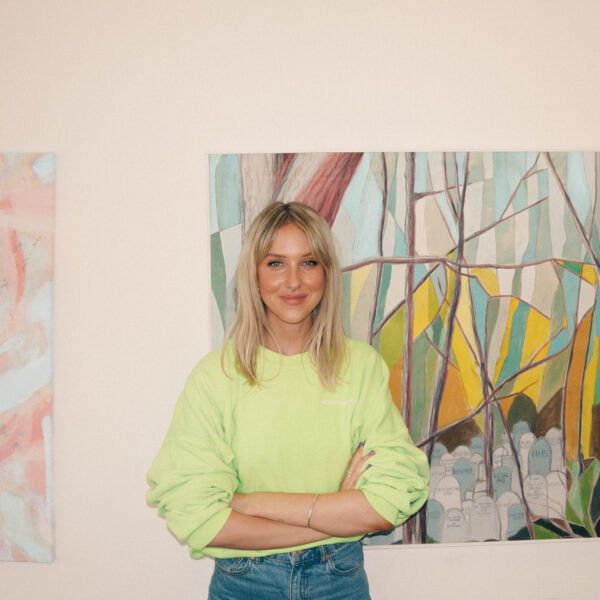
Natasha Collie
Senior Brand Marketing Manager at Penguin Random House UK
At the start of the year, Ladybird Books approached Sonder & Tell with a dream brief. In 2021, a year that’s been particularly challenging for...
In conversation with
Director of Brand & Creative, Wise

“Can you interrogate a hard problem together, kick it around, and step through it?” It’s what Iona Carter asks when looking for agency partners, whether in roles at OLIO, a very early Plum Guide or for her own business. As she gets comfy – and brave – at Wise, we spoke about creativity in fintech, why you should never stop talking to your customers, and why you should definitely stop pitting brand against performance marketing.
My favourite definition of brand is ‘memory real estate’. Credit to John James for that one.
A well-executed brand strategy acts as a multiplier across all your funnels — not just your customer acquisition and retention, but also your employee acquisition and retention, your ability to convert media contacts into coverage, your investment funnel if you’re VC-backed etc.
Upper-funnel ‘brand’ marketing is as critical to healthy and sustainable growth as lower-funnel ‘performance’ marketing. Both drive commercial performance; the challenge is that for brand, the returns profiles are longer, and it’s harder to measure. Ultimately it’s one funnel; the dichotomy between ‘brand’ and ‘performance’ in my view has become unhelpful.
Beyond the obvious exemplars Airbnb, Apple and Nike etc., I’ve recently been impressed by Surreal, Who Gives A Crap and Numan.
Become a customer (if you’re not already). If there’s more than one way to become a customer, i.e. multiple products, make sure you’re onboarded as a customer to all of them. Then speak to stakeholders – from fellow customers (never stop talking to customers!) and fellow employees (up, down, sideways, across the org), to early investors and new shareholders, to agency partners and platform vendors. Then, read and absorb all the documentation you can: from company strategy decks to archived ad creative. Bonus tip: write down your week 1 reflections with your fresh eyes still intact (you’ll come back to those early observations)… and if you’re brave, share them with your new team too.
Trust is critical in our category, and creative plays a key role here. It’s the number 1 barrier that stops people from making the obvious switch from their traditional high street bank to a fintech like Wise. The other piece I’d call out is the salience challenge: particularly in the FX category, where the customer problems we solve are not daily / weekly occurrences, brands need to establish mentality availability so when consumers come into market and need to do something in another currency, they think of Wise first. Creative here is the critical lever. We’re always evaluating our work, particularly upper-funnel marketing, through the lens of distinctiveness and memorability.
I worked with an exceptional team building the Plum Guide brand from the ground up. At a critical inflexion point, we partnered with Mythology in NYC, and I saw first-hand what excellence looks like in the brand-building space. Controversial view but I think most brand work is pretty mediocre and underwhelming. Very few people do it well. It needs to be founded on robust customer insight and razor-sharp strategy, but the magic ingredient is exceptional creative vision that delivers a truly distinctive brand. That means you zig whilst everyone else zags. Without getting into the differentiation vs distinctiveness debate, I’m going to echo Jenni Romaniuk’s point of view that developing distinctive brand assets that help build memory structures are absolutely critical.
Running my own business was an incredible learning experience. The brand itself was a labour of love. I kissed a lot of frogs to get to that point! I learned to trust my instincts and high standards, despite everyone around me saying I had pushed hard enough and should settle for ‘good enough’. Brand is so foundational, you’ve got to keep pushing through and yes, parting with agencies if they’re not getting to the answer, or pushing them to do another round of development, until you know it’s right. Do not compromise!
The other thing about running your own business — if you’re a ‘brand marketer’ — is that it turns you, indelibly, into a commercial marketer. Balancing brand and commercial pragmatism is a superpower, and I credit my time running my own business to really learning this lesson through some serious hard yards.
The quality of the conversations with the people who will actually do the work: can you interrogate a hard problem together, kick it around, and step through it? Is there energetic resonance and strong EQ, which means you’ll be able to work through the inevitable moments of crunchiness in the process? And have they got a catalogue of past work that includes at least 1-2 things I really love?

Senior Brand Marketing Manager at Penguin Random House UK
At the start of the year, Ladybird Books approached Sonder & Tell with a dream brief. In 2021, a year that’s been particularly challenging for...

Founder Of Simple Politics
Talking about serious issues doesn’t mean defaulting into a serious tone of voice, or using complicated language. If anything, accessibility, clarity and a touch of...

Brand & Community Manager at Homethings
Creating a tone of voice from scratch can be challenging. But a blank slate to work from also mean there’s room for something a bit...

Country Manager for Karma Drinks

Head of Creative at Tony's Chocolonely